In 2020, JPMorgan Chase & Co. launched the New Skills ready network across six domestic sites to improve student completion of high-quality career pathways with a focus on collaboration and equity. As a national partner in the New Skills ready network, Advance CTE strives to elevate the role of state capacity and resources in advancing project priorities and gain a unique perspective on promising practices to strengthen state-local partnerships across the country.
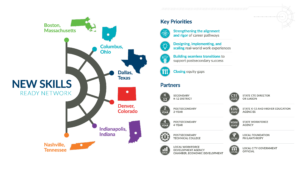
This blog post continues a series that highlights innovative tools and initiatives produced across Boston, Massachusetts; Columbus, Ohio; Dallas, Texas; Denver, Colorado; Indianapolis, Indiana; and Nashville, Tennessee, that advance the initiative’s four key priorities and serve as a guide for state leaders in their work to create cohesive, flexible and responsive career pathways.
For this post, Senior Policy Associate Haley Wing interviewed Nuri Chandler-Smith, the Dean of Academic Support and College Pathway Programs at Bunker Hill Community College, and Liya Escalera, the Vice Provost for Academic Support Services and Undergraduate Studies at the University of Massachusetts (UMass) Boston, who is also on the leadership team for the New Skills ready network. The interviews sought to learn more about the dual enrollment and early college programs within their respective schools, with a focus on learner engagement and cultural wealth.
Background
Dual enrollment programs at Bunker Hill Community College and UMass Boston enable learners within Boston Public Schools to earn college credit and gain early exposure to college experiences on campus while in high school, including during the summer months. The partnerships are coordinated centrally through Boston Public Schools and extend learning from the school building to the university campus. The expansion of accessible dual enrollment programs in Boston helps to advance one of the project priorities of the New Skills ready network initiative to improve learners’ seamless progression from secondary to postsecondary education. Through supporting the expansion of dual enrollment opportunities and supporting policies and procedures that facilitate equitable access to these programs, Boston Public Schools, Bunker Hill Community College, and UMass Boston are ensuring learners have the tools and experiences to make fully informed decisions regarding their postsecondary coursework and path to career success.
Dual Enrollment Programs at Bunker Hill Community College
Bunker Hill Community College (Bunker Hill) dual enrollment programs stand out because of their commitment to improving access to and success in these programs through seamless communication and intentional program connections between secondary and postsecondary programs. Bunker Hill is working directly with guidance staff at high schools, especially Charlestown High School, to make sure learners are aware of the dual enrollment and early college programs that are available. Strategies to increase awareness include pre-recorded dual enrollment info sessions tailored explicitly for flexible use by practitioners with learners and families during workshops and advisories, and one-on-one course mapping exercises with learners to build their mindset for multi-year access to dual enrollment at Bunker Hill. Guidance teams work closely with teachers to utilize multiple measures in identifying learners for dual enrollment. This includes prior academic preparation, attendance, study habits, and willingness to take responsibility for their learning process. Charlestown’s practices are consistent with the district-wide open-access dual enrollment policy. This spring, they are working to cohort learners into advisories, based on their pathways, to provide more targeted academic and career planning needed for increased persistence throughout the dual enrollment course experience.
Bunker Hill has a unique partnership with Charlestown High School. Charlestown High School has a program for learners that allows them to take an exploratory course in the ninth grade to expose learners to various pathways that lead to high-wage and high-demand careers as a prerequisite to dual enrollment courses. Through this course, school leaders strive for learners to make more intentional choices about their course selections in dual enrollment and feel more prepared to complete these programs. Launched in 2018, learners in Charlestown High School can access designated pathways in technology and business. Access to a third early college pathway, allied health, opened a year later. For Charlestown’s graduating class of 2021, learners in the early college cohort completed with more than 300 combined college credits.
Charlestown learners participating in these programs can also access expanded course options — this include 17 unique courses across the Bunker Hill catalog ranging from Principles in Engineering to Human Biology/lab. Strong staff relationships between Charlestown and Bunker Hill have allowed the teams to re-envision supports for learners, including pivoting to a cohort model for learning that enables learners to more successfully participate in coursework. The New Skills ready network grant has facilitated increased communications and partnerships with industry partners, which has created the conditions for additional support structures where learners now have access to mentors practicing in fields aligned to the learners’ pathways.
Dual Enrollment Programs at the University of Massachusetts Boston
UMass Boston’s dual enrollment programs stand out for their focus on cultural wealth using place-based learning and intense learner support through an alumni-based mentorship program. UMass Boston has a collection of dual enrollment classes decentralized across the university – some classes are a part of precollegiate programs, while others are partnerships between UMass Boston’s individual departments and local high schools. UMass Boston utilizes this unique system because it allows faculty to focus more time on co-designing secondary and postsecondary coursework with partners in the Boston Public School system to better support learner transitions.
UMass Boston has centered its program design on valuing cultural wealth. This includes creating culturally-sustaining programs that draw upon the strengths of learners, their families, and their neighborhoods, and taking into account the issues that are important to learners. Tapping into learners’ individual experiences within their communities is important to take seriously, emphasized UMass Boston Vice Provost for Academic Support Services and Undergraduate Studies Liya Escalera. When learners’ place-based experiences and strengths are integrated into learning, they can use skills gained to be uniquely positioned to find solutions to challenges facing the city. Escalera also highlighted that enrolling in dual enrollment courses demystifies the content and rigor of postsecondary coursework and demonstrates to learners that they have the ability to succeed in college.
Additionally, UMass Boston has piloted a program where mentoring and tutoring are embedded in dual enrollment spaces. UMass Boston utilizes graduates who are not only recent alumni but also participated in dual enrollment courses at the institution. In addition to providing one-on-one mentorship outside the classroom, UMass Boston alumni attend classes to ensure the assistance they are providing to learners parallels the material they are learning. UMass Boston has stressed the importance of ongoing support for learners’ continued academic success, especially considering the learner population they serve, including low-income, first-generation, and racially underrepresented learners.
Program Highlights, Successes and Lessons Learned
The New Skills ready network grant has enabled an expansion of dual enrollment courses, particularly within the emerging pathways of business, finance and environment science in the site’s focus schools. The New Skills ready network grant has also allowed postsecondary institutions in Boston to focus on learner flexibility. For example, UMass Boston has redefined what it means to be a successful learner aligned to their career goals. Boston partners are using resources available thanks to the New Skills ready network initiative to create a more uniform inclusion of career-specific skills into courses, including public speaking and leadership into the dual enrollment curriculum in addition to academic skill-building.
As the secondary and postsecondary partners in Boston, Massachusetts, continue to refine their dual enrollment opportunities for learners, they engage in critical reflection to ensure they are meeting learners’ needs. Since its early start in 2015, Bunker Hill has added career and pathway exploration opportunities aimed to offer learners multiple on-ramps to participation in early college and to provide learners with a foundational understanding of the options before selecting a pathway. Bunker Hill Community College replaced its original offering of college courses for first-year high school learners with an exploratory program for ninth-grade learners which was successful and provided learners and families with opportunities to understand the early college pathway option. If learners are still undecided about the pathways they want to pursue after tenth grade, they can continue to take classes at Bunker Hill Community College throughout high school to ensure the pathway they choose is one they are passionate about and prepares them for their careers.
At UMass Boston, dual enrollment courses that were too specific in their curriculum caused learners who transferred into different career pathways to experience a loss of credit, which prevented acceleration in their postsecondary experiences. Instead, UMass Boston has moved towards ensuring all pathways encourage learners to pursue coursework that interests them without fear of falling behind in coursework requirements.
Visions for the Future
Looking forward, Bunker Hill is focused on sustainability to ensure learners will continue to have access to high-quality dual enrollment programs. This involves ensuring that all learners, regardless of their socioeconomic status and backgrounds, have access to wraparound supports and to remove barriers to success. There is an understanding that the racial disparities seen in dual enrollment programs and in higher education, in general, are not because learners are choosing not to access resources, or because they do not have the skills or ability to succeed, but rather because the institutions are not serving them to the level they need for success and they need to embody a new equity-minded and asset-based paradigm that can facilitate learners’ success. At UMass Boston, a priority for the future is flexibility. Learners should be allowed to make mistakes and change their career goals while still being ahead of the game. UMass Boston is embedding work-based learning into transferable general education courses. Additionally, creating a sense of belonging and community with an emphasis on cultural wealth within their dual enrollment programs is paramount.
The Boston, Massachusetts team is committed to supporting policies and procedures that will enable learners to more readily participate across the district, beyond the focus schools. Within its Postsecondary transitions working group, partners across sectors have coalesced around priorities for strengthening systems and structures that will enable more effective dual-enrollment partnerships and increase access for all learners.
Tejas Shah, State Policy Intern
 House Lawmakers Advance FY23 Education Funding Bill
House Lawmakers Advance FY23 Education Funding Bill

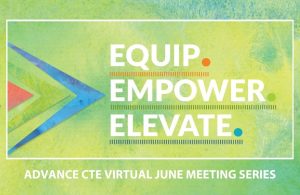 On June 22, Advance CTE hosted the third and final event in its three-part June Meeting Series. The day focused on the theme of “Elevate,” and offered knowledge about raising the profile of Career Technical Education (CTE), so that key stakeholders and the public support and engage with the field.
On June 22, Advance CTE hosted the third and final event in its three-part June Meeting Series. The day focused on the theme of “Elevate,” and offered knowledge about raising the profile of Career Technical Education (CTE), so that key stakeholders and the public support and engage with the field. 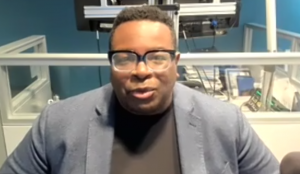 One practical tip Dennis offered: “Start your email subject line with the words ‘STORY IDEA.’” Something that simple can make him jump right to the email.
One practical tip Dennis offered: “Start your email subject line with the words ‘STORY IDEA.’” Something that simple can make him jump right to the email. 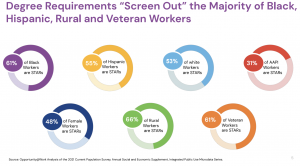
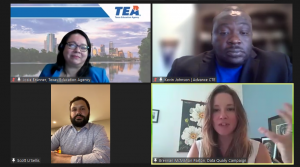
 My name is
My name is  Introduction
Introduction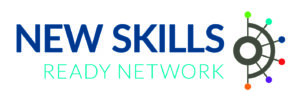 The first project I was assigned to involved the
The first project I was assigned to involved the 
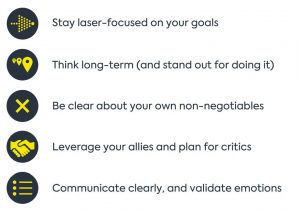
 My name is Brice Thomas and I’m excited to be a part of the Advance CTE team. I serve as a policy associate directly supporting Advance CTE’s state policy initiatives. I lead state policy tracking for legislation impacting Career Technical Education (CTE) while also contributing to projects including research and resource management associated with building high-quality career pathways. I also manage the
My name is Brice Thomas and I’m excited to be a part of the Advance CTE team. I serve as a policy associate directly supporting Advance CTE’s state policy initiatives. I lead state policy tracking for legislation impacting Career Technical Education (CTE) while also contributing to projects including research and resource management associated with building high-quality career pathways. I also manage the  My name is Steve McFarland and I am the new Director of Communications and Membership for Advance CTE. In this role, I lead the organization’s internal and external membership engagement, professional learning and strategic communications. I direct technical assistance, resource development and related supports to Advance CTE members and partners to advance the organization’s strategic priorities and mission, build in-state capacity for Career Technical Education (CTE) leadership, and raise the visibility of and support for high-quality and equitable CTE throughout the country.
My name is Steve McFarland and I am the new Director of Communications and Membership for Advance CTE. In this role, I lead the organization’s internal and external membership engagement, professional learning and strategic communications. I direct technical assistance, resource development and related supports to Advance CTE members and partners to advance the organization’s strategic priorities and mission, build in-state capacity for Career Technical Education (CTE) leadership, and raise the visibility of and support for high-quality and equitable CTE throughout the country.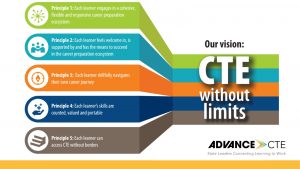 March 2022 marks one year since the release of
March 2022 marks one year since the release of 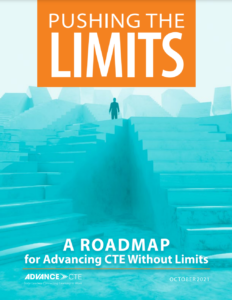 Achieving
Achieving 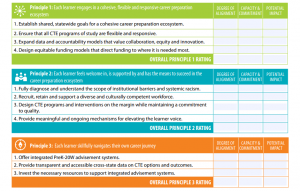 Effective use of the roadmap
Effective use of the roadmap